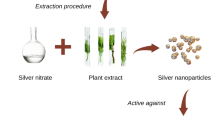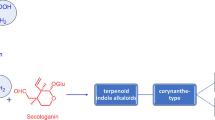Abstract
The present study was conducted to develop a green process that provides access to the development of Schiff base derivatives of chitosan with the heterocyclic moiety as a novel class of anti-gastric cancer agent. In the present study, we have synthesized these derivatives by reacting various pyrazoles with chitosan using CAN in PEG400. The compounds were synthesized in 20 min in excellent yield by using CAN at 5% in PEG400 at 80°C in the shortest reaction time of 20 min. The PEG400 could be efficiently recycled for the three consecutive runs. The developed compounds were tested for EGFR-TK inhibition using a Kinase-Glo Plus luminescence kinase assay kit where they exhibited significant activity revealing compound 2d as the most potent analog, while other compounds showed mild to moderate inhibitory activity. MTT assay was conducted to determine the effect of the three most potent EGFR inhibitors (2b, 2c, and 2d) on the proliferation of gastric cancer cells (SGC-7901). The results showed compound 2d as the most potent anticancer agent against SGC7901 cells. The effect of compound 2d was also quantified on the apoptosis and cell phase of SGC7901 cells using flow cytometry assay at various concentrations ranging from 0, 10, 20, and 30 µM. Results suggest that compound 2d showed significant inhibition of SGC-7901 by inducing apoptosis and arresting G0/G1 cell phase. The western blot analysis also revealed that compound 2d significantly inhibited the overexpression of EGFR in SGC-7901 cells. The study successfully demonstrated the development of N‑pyrazole amino chitosan as a novel class of agent against gastric cancer via inhibition of EGFR.




Similar content being viewed by others
References
Adhikari HS, Yadav PN (2018) Anticancer activity of chitosan, chitosan derivatives, and their mechanism of action. Int J Biomater 2018:2952085
Allum WH, Blazeby JM, Griffin SM et al (2011) Guidelines for the management of oesophageal and gastric cancer. Gut 60:1449–1472
Aranaz I, Alcántara AR, Civera MC, et al (2021) Chitosan: an overview of its properties and applications. Polymers (Basel) 13:3256
Banger A, Srivastava A, Yadav A, et al (2023) Application of green solvent in green chemistry: an overview. Green Chem Technol Lett 9:1–14. https://doi.org/10.18510/gctl.2023.911
Brand TM, Iida M, Luthar N et al (2013) Nuclear EGFR as a molecular target in cancer. Radiother Oncol 108:370–377
Carneiro BA, El-Deiry WS (2020) Targeting apoptosis in cancer therapy. Nat Rev Clin Oncol 17:395–417
Carneiro F (2012) Hereditary gastric cancer. Pathologe 33(Suppl 2):231–234
Dai H, Meng W, Kaufmann S (2016) BCL2 family, mitochondrial apoptosis, and beyond. Cancer Transl Med 2:7. https://doi.org/10.4103/2395-3977.177558
Dhakshinamoorthy A (2005) Cerium(IV) ammonium nitrate: a versatile oxidant in synthetic organic chemistry. Synlett. https://doi.org/10.1055/s-2005-921893
Dutta PK, Duta J, Tripathi VS (2004) Chitin and chitosan: chemistry, properties and applications. J Sci Ind Res (India) 63
El-Gharably AA, Kenawy ERS, Safaan AA, et al (2022) Synthesis, characterization, antimicrobial and anticancer evaluation of N-aryl aminochitosan. Polym Bull 79. https://doi.org/10.1007/s00289-021-03960-y
Elmore S (2007) Apoptosis: a review of programmed cell death. Toxicol Pathol 35:495–516
Figel S, Fenstermaker RA (2018) Cell-cycle regulation. In: Handbook of brain tumor chemotherapy, molecular therapeutics, and immunotherapy: second edition. pp 257–269
Hessel V, Tran NN, Asrami MR, et al (2022) Sustainability of green solvents-review and perspective. Green Chem 24:410–437
Jingwen B, Yaochen L, Guojun Z (2017) Cell cycle regulation and anticancer drug discovery. Cancer Biol Med 14:348. https://doi.org/10.20892/j.issn.2095-3941.2017.0033
Karimi P, Islami F, Anandasabapathy S et al (2014) Gastric cancer: descriptive epidemiology, risk factors, screening, and prevention. Cancer Epidemiol Biomark Prev 23:700–713
Kılınç D (2018) Effect of Al2O3-supported Cu-Schiff base complex as a catalyst for hydrogen generation in NaBH4 hydrolysis. Energy Sources, Part A: Recov Util Environ Effects 40:873–885. https://doi.org/10.1080/15567036.2018.1463318
Kılınç D, Şahin Ö (2020) Performance of Zn-Schiff base complex catalyst in NaBH4 hydrolysis reaction. Int J Hydrogen Energy 45:34783–34792. https://doi.org/10.1016/j.ijhydene.2020.07.156
Kou S (Gabriel), Peters L, Mucalo M (2022) Chitosan: a review of molecular structure, bioactivities and interactions with the human body and micro-organisms. Carbohydr Polym 282:119132
Kou S (Gabriel), Peters LM, Mucalo MR (2021) Chitosan: a review of sources and preparation methods. Int J Biol Macromol 169:85–94
Kumar MNVR, Muzzarelli RAA, Muzzarelli C, et al (2004) Chitosan chemistry and pharmaceutical perspectives. Chem Rev 104:6017–84. https://doi.org/10.1021/cr030441b
Masih A, Singh S, Agnihotri AK et al (2020) Design and development of 1,3,5-triazine-thiadiazole hybrids as potent adenosine A2A receptor (A2AR) antagonist for benefit in Parkinson’s disease. Neurosci Lett 735:135222. https://doi.org/10.1016/j.neulet.2020.135222
Naaz R (2009) Synthetic transformation mediated by cerium (IV) ammonium nitrate (CAN): a green catalyst. Res J Chem Environ 13:96–98
Nicholson RI, Gee JMW, Harper ME (2001) EGFR and cancer prognosis. Eur J Cancer 37:9. https://doi.org/10.1016/s0959-8049(01)00231-3
Nie Y, Wu K, Yu J et al (2017) A global burden of gastric cancer: the major impact of China. Expert Rev Gastroenterol Hepatol 11:651–661
Oliveira C, Pinheiro H, Figueiredo J et al (2015) Familial gastric cancer: genetic susceptibility, pathology, and implications for management. Lancet Oncol 16:e60–e70
Raut DG, Bhosale RB (2018) One-pot PEG-mediated syntheses of 2-(2-hydrazinyl) thiazole derivatives: novel route. J Sulfur Chem 39:1–7. https://doi.org/10.1080/17415993.2017.1371175
Shaoming W, Rongshou Z, Siwei Z et al (2019) Epidemiological characteristics of gastric cancer in China, 2015. Chin J Endemiol 40:1517–1521. https://doi.org/10.3760/cma.j.issn.0254-6450.2019.12.003
Singh U, Bhat H (2017) PUB081 discovery of 1,3,5-triazine based novel EGFR-tyrosine kinase inhibitor against human lung carcinoma. J Thorac Oncol 12:S1494–S1495. https://doi.org/10.1016/j.jtho.2016.11.2051
Singh UP (2012) Peg 400. Synlett 23:2721–2722. https://doi.org/10.1055/s-0032-1317353
Singh UP, Bhat HR, Singh RK (2013) Ceric ammonium nitrate (CAN) catalysed expeditious one-pot synthesis of 1,3-thiazine as IspE kinase inhibitor of Gram-negative bacteria using polyethylene glycol (PEG-400) as an efficient recyclable reaction medium. C R Chim 16:462–468. https://doi.org/10.1016/j.crci.2012.11.019
Soni J, Sahiba N, Sethiya A, Agarwal S (2020) Polyethylene glycol: a promising approach for sustainable organic synthesis. J Mol Liq 315:113766
Sridharan V, Menéndez JC (2010) Cerium(IV) Ammonium nitrate as a catalyst in organic synthesis. Chem Rev 110:3805–3849. https://doi.org/10.1021/cr100004p
Srivastava JK, Pillai GG, Bhat HR et al (2017) Design and discovery of novel monastrol-1,3,5-triazines as potent anti-breast cancer agent via attenuating Epidermal Growth Factor Receptor tyrosine kinase. Sci Rep 7:5851. https://doi.org/10.1038/s41598-017-05934-5
Suen DF, Norris KL, Youle RJ (2008) Mitochondrial dynamics and apoptosis. Genes Dev 22:1577–1590
Sun C, Du K, Fang C, et al (2010) PEG-mediated synthesis of highly dispersive multifunctional physicochemical properties and function. ACS Nano 4:2402–2410
Sung H, Ferlay J, Siegel RL et al (2021) Global Cancer Statistics 2020: GLOBOCAN estimates of incidence and mortality worldwide for 36 cancers in 185 countries. CA Cancer J Clin 71:209–249. https://doi.org/10.3322/caac.21660
Ueno NT, Zhang D (2011) Targeting EGFR in triple negative breast cancer. J Cancer 2:324–328. https://doi.org/10.7150/jca.2.324
Wagner AD, Grothe W, Haerting J et al (2006) Chemotherapy in advanced gastric cancer: a systematic review and meta-analysis based on aggregate data. J Clin Oncol 24:2903–2909. https://doi.org/10.1200/JCO.2005.05.0245
Wrasman CJ, Zhou C, Aitbekova A, et al (2022) Recycling of solvent allows for multiple rounds of reproducible nanoparticle synthesis. J Am Chem Soc 144:11646–11655. https://doi.org/10.1021/jacs.2c02837
Yang W, Raufi A, Klempner SJ (2014) Targeted therapy for gastric cancer: molecular pathways and ongoing investigations. Biochim Biophys Acta Rev Cancer 1846:232–237
Funding
This study received financial support from Heilongjiang Provincial Natural Science Foundation of China (LH2022H063).
Author information
Authors and Affiliations
Corresponding author
Ethics declarations
Conflict of interest
The authors declare no competing interests.
Supplementary Information
Below is the link to the electronic supplementary material.
Rights and permissions
Springer Nature or its licensor (e.g. a society or other partner) holds exclusive rights to this article under a publishing agreement with the author(s) or other rightsholder(s); author self-archiving of the accepted manuscript version of this article is solely governed by the terms of such publishing agreement and applicable law.
About this article
Cite this article
Zhang, L., Li, C. Eco-friendly green synthesis of N‑pyrazole amino chitosan using PEG-400 as an anticancer agent against gastric cancer cells via inhibiting EGFR. In Vitro Cell.Dev.Biol.-Animal 60, 365–373 (2024). https://doi.org/10.1007/s11626-024-00890-7
Received:
Accepted:
Published:
Issue Date:
DOI: https://doi.org/10.1007/s11626-024-00890-7




